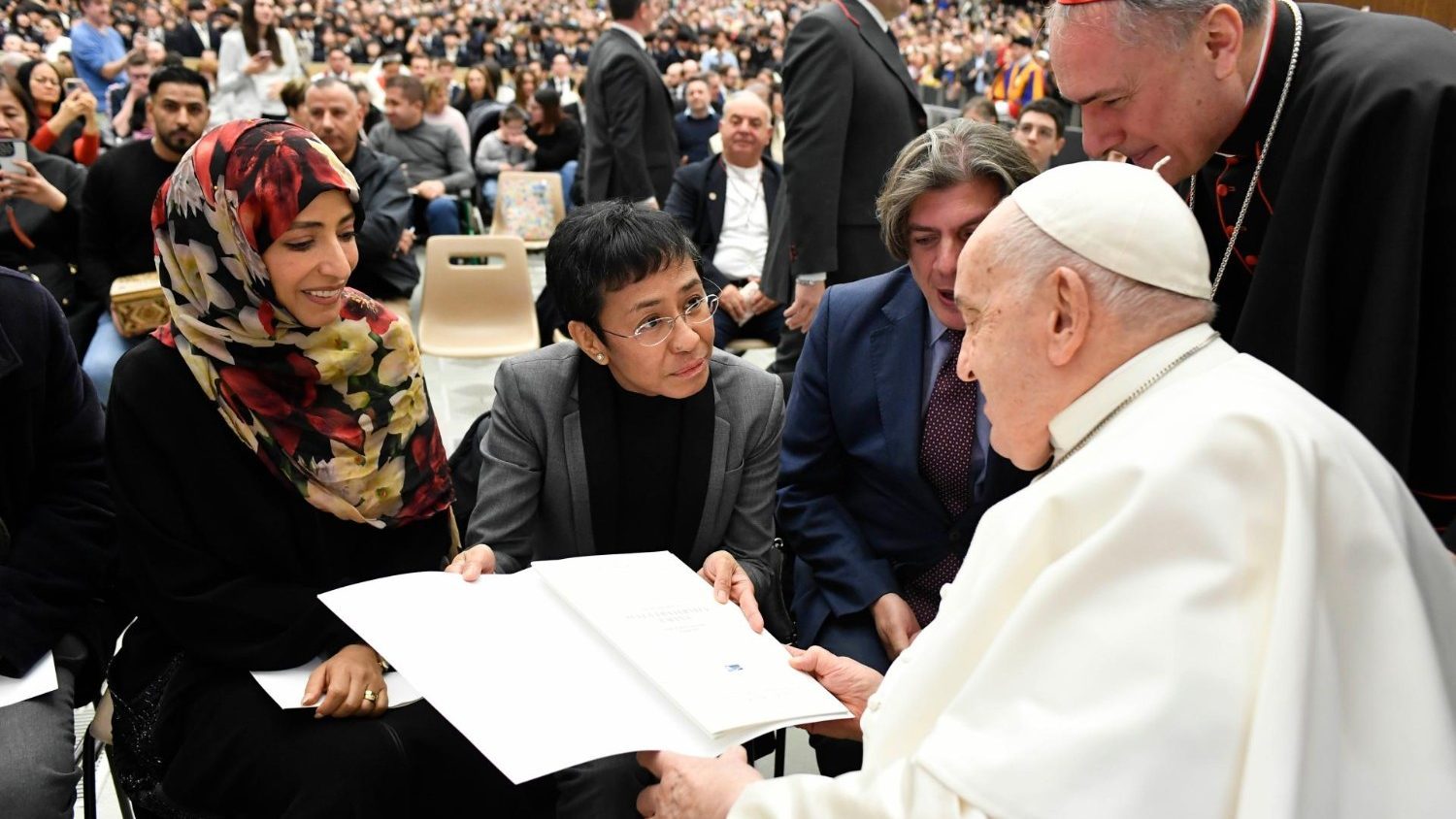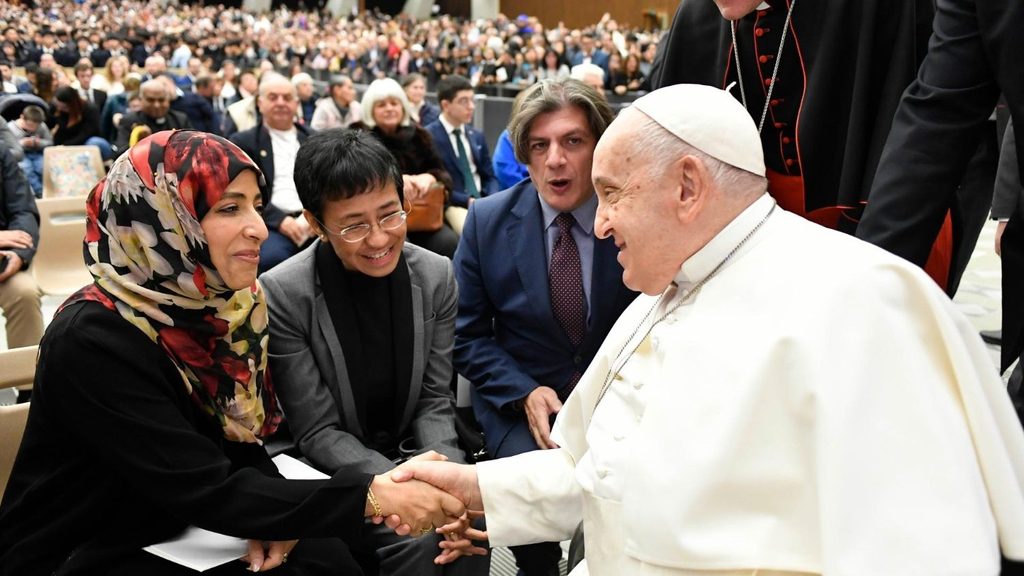SUMMARY
This is AI generated summarization, which may have errors. For context, always refer to the full article.

MANILA, Philippines – Two women recipients of the Nobel Peace Prize, Maria Ressa of the Philippines and Tawakkol Karman of Yemen, met Pope Francis on Wednesday, December 6, to present a landmark declaration on human fraternity.
With them was Giorgio Parisi, an Italian physicist who won the Nobel Prize in Physics in 2021.
Ressa, 60, is the CEO of the Filipino news website Rappler and also a former bureau chief at CNN, while Karman is a 44-year-old Yemeni human rights activist. Ressa, who was sued and persecuted for Rappler’s critical reportage, won the Nobel Peace Prize in 2021 while Karman received the award in 2011, the first Arab woman to win a Nobel and also one of the youngest laureates at the age of 32.
On Wednesday, December 6, the leader of the nearly 1.4-billion-strong Roman Catholic Church briefly met with Ressa, Karman, and Parisi at the Vatican’s Pope Paul VI Hall to receive a copy of the Declaration on Human Fraternity. Ressa and Karman were among the Nobel laureates who originally drafted and signed the declaration while Parisi was among those who added their signatures.
“He was fantastic,” Ressa said of their meeting with the Pope. She also gave the Pope the Italian translation of her book How to Stand Up to A Dictator, which is titled Come Resistere a Un Dittatore in the Italian language. “He said, ‘Please pray for me,'” Ressa recounted.
The Declaration on Human Fraternity, prepared by 30 Nobel Peace Prize laureates, appealed for closer brotherhood and sisterhood to prevent war, sexual violence, forced migration, and the manipulation of artificial intelligence (AI).
The Nobel laureates were supposed to present the declaration to Francis on June 10, but the 86-year-old pontiff was still confined in the hospital after undergoing surgery. When Ressa and Karman met with the Pope on Wednesday, he was recovering from acute bronchitis that forced him to cancel a trip to Dubai for the COP28 summit on the climate crisis.
The Declaration on Human Fraternity read: “We want to shout to the world in the name of fraternity: Never again war! It is peace, justice, equality that guide the fate of all mankind. No to fear, no to sexual and domestic violence! All armed conflicts must come to an end. We say no more nuclear weapons, no more land mines. No more forced migrations, ethnic cleansing, dictatorships, corruption, and slavery.”
“Let us stop the manipulation of technology and AI. Let us put fraternity before technological development, so that it may permeate it,” it added.
Search for hope
“I’ve been looking for hope for a long time,” Ressa said after their meeting with the Pope.
Ressa said that in 2016, after Rappler came under attack by the Duterte government, “I just thought hope lies in doing the right thing.” Rappler “came out stronger” after this “period of testing and uncertainty,” she said.
The wars in Ukraine and Gaza happened, however, worsened by “the role that technology is playing in further dividing and amplifying hate.”
“It’s enough to make you feel helpless,” Ressa said. “Meeting Pope Francis again gave me hope, and after I thanked him for his recent statements about the violence in the Middle East, Ukraine, the Philippines, he said, ‘Please pray for me.’ I didn’t expect that.”

Ressa said she understood “how hard it must be for Pope Francis to hold together progressive and conservative views in the Church.” She added, “I love that he just keeps trying for the greater good and bringing the marginalized back in. It’s about our shared humanity – and the empathy that keeps us together.”
For the Nobel laureate, “there is no better time to present the Declaration on Human Fraternity to Pope Francis than today, when everything we value, all our global agreements, our democracies (and upcoming elections) are at risk.”
“We need spiritual and moral leadership, and Pope Francis provides that in trying to rejuvenate the Catholic Church,” she said.
In an interview at the Vatican’s Pope Paul VI Hall, Karman addressed the “violence, hatred, and poverty” that has “escalated everywhere.”
“We need to work together for ending the war, of ending the injustice, and to make education and health available for every citizen in the world,” Karman said.
“And the conflict between Israelis and Palestinians should end, and in Ukraine also,” she added. “So we need Pope Francis and all the great people like him to be with us in this declaration.”
Fraternity: Key to understanding Francis
The call for a human fraternity, or a deeper sense of brotherhood and sisterhood among the world’s peoples, is one of the distinguishing features of the Francis papacy.
The Pope’s core ideas on human fraternity are enshrined in the encyclical or papal letter Fratelli Tutti, published on October 3, 2020.
In Fratelli Tutti, Francis criticized populism, rejected the death penalty by overturning a centuries-old teaching, and condemned “globalization and progress without a shared roadmap” as well as “digital campaigns of hatred and destruction.”
“How important it is to dream together…. By ourselves, we risk seeing mirages, things that are not there. Dreams, on the other hand, are built together,” the Pope said in Fratelli Tutti, quoting from his 2019 speech in Macedonia.
“Let us dream, then, as a single human family, as fellow travelers sharing the same flesh, as children of the same earth which is our common home, each of us bringing the richness of his or her beliefs and convictions, each of us with his or her own voice, brothers and sisters all,” the Pope said.
Five years before issuing Fratelli Tutti, the Pope released the encyclical Laudato Si’, an unprecedented papal document that addressed climate change. It is now the basis of many of the Pope’s pronouncements on the climate crisis, including his written intervention at COP28.
The Pope said in Laudato Si’, “The urgent challenge to protect our common home includes a concern to bring the whole human family together to seek a sustainable and integral development, for we know that things can change.” – Rappler.com
Add a comment
How does this make you feel?
![[The Wide Shot] Peace be with China](https://www.rappler.com/tachyon/2024/07/wideshot-wps-catholic-church.jpg?resize=257%2C257&crop=311px%2C0px%2C720px%2C720px)
![[OPINION] A critique of the CBCP pastoral statement on divorce](https://www.rappler.com/tachyon/2024/07/TL-cbcp-divorce-statement-july-19-2024.jpg?resize=257%2C257&crop=285px%2C0px%2C722px%2C720px)


![[The Wide Shot] Was CBCP ‘weak’ in its statement on the divorce bill?](https://www.rappler.com/tachyon/2024/07/cbcp-divorce-weak-statement.jpg?resize=257%2C257&crop=258px%2C0px%2C719px%2C720px)




There are no comments yet. Add your comment to start the conversation.